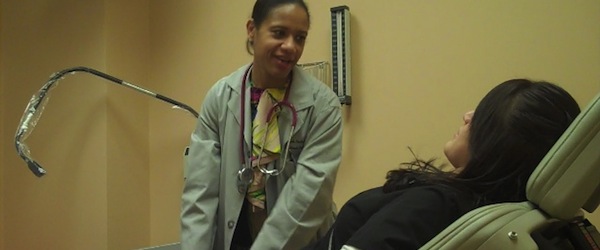Healthcare IT consulting jobs are a great way to take part in the fastest growing industries in America: technical consulting and healthcare! Project management and IT analyst jobs are excellent roles to play in this exploding field. These consultants are focused on making work flow as efficiently and effectively as possible at healthcare facilities (like hospitals). They spend time at the medical offices, interact with the staff, study how their work currently flows and then make recommendations to positively impact that work flow for maximum results. Today’s career video guest is an IT analyst based at Childrens Hospital Los Angeles.
SNEAK PEEK (Full Episode below)
|
RELATED CAREERS |
Today’s Guest
 John Chambers: John’s LinkedIn page
John Chambers: John’s LinkedIn page
College Major: Management Information Systems
College: University of Texas – Austin in Austin, TX
High School: Hudson’s Bay High School in Vancouver, WA
First Job Ever: Selling VHS cassettes at a store in the local mall
Worst Job Ever: Driving pallet jacks at Albertsons supermarket distribution center
Healthcare consulting careers
John explains in today’s career video that there are IT consulting jobs at healthcare facilities, consulting firms and vendors who provide technology solutions. Each route provides a different level of job security, lifestyle and salary. Some types of jobs in the consulting field involve lots of national and international travel while others will keep you based at a medical office for longer projects.
John’s career advice for IT consulting suggests that the business analyst skills and project management skills you’ll need are: having a thick skin, a passion for people and client service plus finding solutions to maximize operational effectiveness at the medical offices. As more of our nation’s health system embraces electronic medical records systems, this area of medical software consulting jobs will only continue to grow. Don’t miss our other videos on Healthcare Careers.
FULL EPISODE (#21)
For our Audio Podcast: Careers Out There on iTunes
TRANSCRIPT OF TODAY’S INTERVIEW
What Do Healthcare IT Consultants Do 2:00-13:05
Education for Healthcare IT Consulting Jobs 13:05-16:50
Most Rewarding Part of Healthcare IT Consulting 16:50-18:05
Typical Day for Healthcare IT Consultant 18:05-20:15
Income for Healthcare IT Analyst Jobs 20:115-24:35
Breaking in to Healthcare IT Consulting Careers 24:35-26:39
Guest John Chambers’ Career Story 26:39-28:05
Keys to Success in Healthcare IT Consulting 28:05
Careers Out There Host Marc Luber: Hey everyone – welcome to Careers Out There. I’m your host Marc Luber and we’re helping you find a career that fits you. Today we’re looking at the exploding career path of healthcare IT consulting. Our guest is an IT Analyst with a lot of experience and a lot of info to share. This is a field where there’s a lot of room for you guys to get jobs, so it’s going to be a real important show. So stick around! [Theme song] OK we’re back. Now before we go to our guest John Chambers, I want to explain a few terms that come up several times in the video. They all deal with the different places you can work if you’re going to go down this healthcare IT consulting path. The first is to work for a vendor. The vendor is providing the IT solution to a healthcare facility like a hospital. The IT solution can be an electronic medical records system and it’s gonna be a whole system that revolves around making the hospital run smoother, run more efficiently and just run better. That’s the whole purpose. So you can work for the vendor, who provides the solution and also provides consultants to help first learn what the hospital needs, create the solution, provide the solution and then implement the solution, teaching the hospital how to use it, making sure everything runs smoothly. So that’s the vendor. Then you can also work – this is the 2nd option – for a 3rd party consulting firm. That firm does the same kind of thing where they’re coming in and consulting the hospital but they’re not also providing the computerized solution. They’re just doing the consulting. Then your 3rd option is of course to work directly for the facility – to be the person working at the hospital and working with these vendors and 3rd party consultants to bring in the system that’s going to make your hospital runs more smoothly and then make sure that happens. Our guest, John Chambers, is a member of the US Air Force and he has more than 6 years of experience as a healthcare IT analyst. At the time of this interview, he was working for a vendor at LA Children’s Hospital but now he works directly for LA Children’s Hospital. Let’s meet John! John – welcome to Careers Out There.
Healthcare IT Consultant John Chambers: Thanks for having me.
[WHAT DO HEALTHCARE IT CONSULTANTS DO starts at 2:00]
Host Marc Luber: John, what does it mean to be a healthcare IT consultant?
Healthcare IT Analyst John Chambers: The best way I think to describe it is a consultant will use technology to both fill in gaps and optimize current healthcare work flows.
Luber: The biggest part of your role then, if I’m understanding right, is for you to put your heads together with the client – and in this case, your company’s client is a hospital. And you’re helping to see how you and your company can help make things run smoother and faster and more efficiently and cheaper for the hospital.
John Chambers: Exactly.
Luber: Ok, alright. So how is that done? Tell us some of the different roles. Your role is technically, you are an Analyst, is that right?
John Chambers: Technically, yeah – that would be the best way to describe my role.
Luber: OK, and so you report to a project manager?
John Chambers: Correct. I specifically report to a project manager who works for Cerner, who works side-by-side with the project manager – several project managers, really – at the client side at the hospital. So he’s really the interface at the management level for me. And he also helps provide direction to me from the client, as far as upcoming projects, the direction we want to take those projects, timelines, deadlines, expectations.
Luber: So walk us through the process – so when the whole thing starts, a hospital – and you’re now at LA Children’s Hospital, right?
John Chambers: Correct.
Luber: OK, so let’s say LA Children’s Hospital decides we’ve got to get more efficient, we’ve gotta do things better, we’re wasting money at this and this, we’re bleeding money…we’re bleeding time and money. They contact a company like yours and they say, “meet with us and tell us what you can do for us”?
John Chambers: Generally, the way things will happen is you’ll have sales people assigned to particular geographical regions…
Luber: So there’s sales teams – so that’s a whole other path, is healthcare IT sales?
John Chambers: Correct. So generally the sales teams are responsible for interfacing us with the client – so they’ll begin the beginning phases of a contract. Once we get past that part, once we have an agreement and the contract’s been signed and we’ve decided that there is some sort of works that Cerner will do specifically for that client, that’s really when the process begins for that analyst or consultant, which begins generally with looking at present state and then looking forward at the future state – so where is it that we want to end up? From there we start looking at work flows…
Luber: So your role in this would be what as an analyst?
John Chambers: As an analyst, I would engage the client, we would talk about their current work flows, their current state…What I would do is I’d take that information and put it into what we call a data collection worksheet, which is then used to customize a Cerner system that we could then implement in the hospital.
Luber: So now when we’re talking about work flows, we’re saying the client’s work flows – work flows – what does that mean? What are their work flows?
John Chambers: OK – the work flow is basically what drives everything – all the processes within the hospital. So there’s a sequence of events that happens from the beginning to the end of something. So for instance, a patient receives a referral from their GP saying that he would like them to have an X-Ray. The General Practitioner will then fax some sort of request or hand write a request, give it to the patient, and the patient then carries it to the hospital. From there they’ll evaluate and say, “OK, this is an outpatient – we have a certain process for that – and it’s different from inpatients.” The scheduling clerk then schedules an appointment with that patient, and once the patient will go home, the day will arrive, the patient will come back, then a series of events: They’ll take him over to the machine, they’ll get him prepped, etcetera, etcetera. Once the images are taken, the images are then sent to a radiologist who reads the images, dictates, those results come back and then it goes back to that General Practitioner so that they can make a determination as to what could possibly be wrong with the patient and go forward with any kind of diagnosis. But everything happens in a sequence of events. And in order to understand, it’s important to break down that process into just that: a sequence of events, so we could identify what’s slowing the process down, what’s costing more money, what could be possibly impacting patient care….So those are all aspects of the work flow that we’re looking to improve.
Luber: OK. And when you’re working on this, you say you’re meeting with the client. Are you going to the hospital and sitting in the hospital with IT people that are employees of the hospital?
John Chambers: In some cases. Some cases I work with the IT staff. Other times I’ll actually be sitting next to a radiologist while they’re reading films. Sometimes I’ll walk around with a radiology technologist as they’re performing their exams, so I can watch: what are working through? A technologist is a good example. They can actually work off of a work list that’s on the machine itself. So whatever scanner they may be using may have a work list built in. Other times they may have something printed out on a clipboard. So you can make evaluations just watching them do their job and say, “well, maybe if we can get a work list on the machine, they wouldn’t have to carry this paper, which means it’s one less thing for them to think about….by getting rid of the paper we could start reducing paper costs for the hospital and then if they’re actually working from that machine, that means when they’ve completed that exam, that information will be instantaneously available to the radiologist so that they can start reading. So we’ve also cut down and shortened the amount of time it takes to get that image to the doctor, back to the General Practitioner so they can start making evaluations for that patient’s health.”
Luber: That’s amazing. So you’re speeding up the whole process. You’re streamlining everything for all parties involved.
John Chambers: That’s what we’re trying to do.
Luber: That’s great! And then what about travel? You explained to me that right now you’re at Children’s Hospital, sometimes you’re at a different hospital. Sometimes you’re in a different country! Explain how that works…so the company places you wherever there’s a need at that moment? How does that work?
John Chambers: Yeah, ultimately that’s what it boils down to. It boils down to business needs at the time. So for instance, I started with Cerner in 2004, and by the time 2005 had come around, Cerner had won a couple of contracts in the UK for a project with the National Health System. So with that, they needed 4 consultants on the ground almost immediately. So myself and 3 others volunteered and before we knew it we were moving into our new places in London and beginning the project! I’ve worked in other places and it all really seems to happen that way. I’ve never really had anything forecasted out to say, “OK, well in 2012 I’m going to work here.” It doesn’t seem to pan out quite like that – it seems to happen without notice – in a flash.
Luber: So then if someone’s watching right now and they’re thinking, “I might want to be an analyst, a healthcare IT consultant,” should they be someone who is able to pack their bags and jump to wherever is needed? Or are they able to say, “I live in this town and I’m staying in this town?”
John Chambers: You know, that’s really the beauty about this industry. It accommodates everything and everybody. Let’s say somebody decides they want to be a healthcare analyst, an IT analyst, and they don’t want to leave the city that they live in. Say Los Angeles. There are many, many, many hospitals in Los Angeles county that have a need for IT analysts that have an understanding of everything from infrastructure to the software the end users will be utilizing on their day-to-day jobs. So an understanding of those systems can make you marketable to those local hospitals. Now there’s also options to work at a vendor in a consulting role that’s similar to the 3rd party consulting role where you need to be comfortable with 80% or better travel, spending a lot of time in hotel rooms and eating at restaurants and then coming home only – say – usually you come home on a Friday and then leave again Monday morning for either the same client or another client’s site. And then as this industry continues to grow, you’re gonna see a larger need for people with flexibility to work overseas. Since 2005, we’ve had projects in France, Germany, the Middle East – to include United Arab Emirates, Saudi Arabia, Singapore, Australia, Chile…and it’s continuing to grow and grow and grow. So as it does, they’re gonna have a need for folks to go over there and help with those implementations there. And one more thing is that these countries that we’re implementing these health records in- keep in mind they really have a lot of times a smaller pool of folks to recruit from to bring in to these facilities to support the systems once the consultants leave. So if one can think about their career on a global level rather than locally or within the continental U.S., it will really open many many many more doors to explore their career.
Luber: Wow. That sounds fun too because then you get to see the world!
John Chambers: Absolutely.
Luber: Yeah! Explain the difference between your role and a project manager’s role. I think we touched on it a bit but I just want to get it real clear for people to see that there are 2 different paths. And also, does someone have to be an analyst before they become a project manager?
John Chambers: Not necessarily. It’s my feeling that a good project manager understands the industry that he’s working in. So if he’s managing a project in the automotive industry, then he really needs to understand how that industry functions and works from the top all the way down to the bottom – to the guy putting the tires on the car. And the same holds true for healthcare and healthcare IT. The really good project managers that I’ve worked with are people who understand at least to some degree how these systems work. You know – the fact that there’s a database and information is stored there. The fact that there are several different applications that are used across the entire health system to access that information in the database. Great people skills is important for project manager. The difference really between a project manager and an analyst is the project manager is working on the timeline of the project, making sure that: 1) we stay on budget; 2) we finish in the time allotted – so if we set a deadline for 18 months that we finish in 18 months……………So that’s really – the big thing is time and money – that’s what the project manager is concerned about – and of course the people. The analyst is the one with the technical know-how to 1) collect the design decisions and interface with the client; and configure the system to meet those requirements.
[EDUCATION FOR HEALTHCARE IT CONSULTING JOBS starts at 13:05]
Luber: OK. So technical know-how. That’s a good transition then – let’s run with technical know-how. So the technical know-how is something you would have learned in school. Walk us through the type of education that you see being necessary to get this kind of a job. What they’re looking for at the companies that are hiring people like you – and what you felt you needed to have to be feeling that you’re confident and smart about what you’re doing.
John Chambers: Yeah. Surprisingly enough, the technical aspect of it I learned once I started working for the company. A typical MIS degree is gonna be comprised of your basic general educational requirements of course – and of course in business school there’s a set standard of classes that everyone within the business school is gonna take. You know: accounting, finance, marketing, blah blah blah. What they do is they introduce you really to different aspects of information systems. The idea is that when you go down to speak to a programmer and say, “you know what – I spoke to the client – they really like what you’ve done here – however they would like to go ahead and pull in the margins, maybe increase the blue, change the contrast in this area” and you can say to the programmer, “maybe we should go ahead and shrink this piece in your code and possibly speak in terms the programmer understands and then when the programmer responds to you you can actually interpret it and speak to the client in a language that THEY understand. So we did things like HTML, JAVA, like I said – some project management courses….just some real basic fundamentals so that when we did start our first job we could speak intelligently with them about the industry and the kind of work that they’re trying to do.
Luber: OK. So the MIS degree – that’s what you got. Is that what generally is needed for people? What else do you see? What other kinds of degrees? If someone’s watching right now and they’re saying, “I want to do what this John guy does” – what should they be focused on school-wise?
John Chambers: Wow, there’s a couple of different avenues. I’ll talk about 3 different avenues. One is somewhat of a – you can go with a technical degree. So if what excites you is actually developing the software itself, writing the code, looking for new ways to improve the software, that’s more of a computer science degree or a computer information systems degree – something that’s a little bit more technical in schooling. OR there’s also if you’re looking more for consulting and you want to be engaged a bit more and have a bit more understanding of the business aspect and impact of everything – there’s a number of business degrees that would be fine. Management Information Systems, I think is a good degree. It’s a good start, a good platform. Also: degrees in healthcare – RNs do amazing. Anybody who is linked in to the industry itself, whether they’re a pharmacist, a nurse, a pharmacy tech, radiology tech…those people make fantastic IT consultants in this industry.
Luber: So there’s nurses who are actually, rather than being – because everyone thinks of nurses being by the bedside. There are actually nurses going down your path?
John Chambers: Yes. Doctors, pharmacists…absolutely. All levels.
Luber: Wow. OK.
John Chambers: So those are 3 paths, I would say. But to be honest, because it is such a big, such a growing industry, there are a lot of companies out there that simply require you to have a degree and a willingness to learn and a passion for the industry. If that’s you, there’s a lot of companies that will hire you and invest the training to make you a successful consultant.
[MOST REWARDING PART OF HEALTHCARE IT CONSULTING starts at 16:50]
Luber: Well let’s run with passion, because you really like what you do and we’re talking passion… so tell us what’s the fun part of this job? What is it that gets you off about your job?
John Chambers: It’s a couple things! Sometimes I like to sit down at my computer, put on my headphones, let everything go away and just focus on the work that I need to do on my computer – whether it’s emails, build configurations, there’s just a number of things. But the next day I may not feel like that at all. I may want to just be engaged with people all day. And I can do that. I don’t have anybody watching over my shoulder. I don’t punch a clock. Some days I work a lot of hours. Some weeks I work a lot of hours. Other weeks not so much. Those are really the things – and I can see the impact that my work has on the hospital and the people who are working at the hospital – and that’s really rewarding. That’s REALLY rewarding – when you can do something for a nurse that makes her job that much easier so they can focus more on providing care for the patients, it really is rewarding. It sounds kind of cheesy maybe but….
[TYPICAL DAY FOR HEALTHCARE IT CONSULTANT starts at 18:05]
Luber: No! That’s great! What about since you touched on the flexibility of the schedule, tell us just briefly what is – walk us through a typical day.
John Chambers: It’s kind of hard to say because there’s so many variables involved. For me, I can tell you I check my email, fire out any responses, go have a chat if there’s any issues at the hospital – say maybe the day before or they’re currently working on – I’ll go to the hospital, have some face-to-face, come back, get on the phone, interface with headquarters in Kansas City, double check any solutions that they may be working on over there for the clients here in LA, make sure that’s moving forward, and we spend a lot of time looking for ways to add additional benefits that go above and beyond the contract – the scope of the contract that we already have signed.
Luber: What about the lifestyle? You’ve talked about the flexibility, the moving around, would you say it’s like a long day, high stress situation? You said every day is kind of different, but overall, is it a really stressful job? Is there a work-life balance that you get with this kind of path? Tell us about that quickly.
John Chambers: Yeah, it really depends. I’ll tell you – I mentioned the UAE earlier – the 6 months that I worked in Abu Dabi, there’s just a series of clients – hospitals – that were going to be going live within the 6 month period of time and we had 3 – so we were bringing 1 up every 2 months. There was 1 week I logged over 100 hours and a lot of my weeks were probably average 60-80 hours, which is an obscene amount. In a situation like that, there really isn’t much of a work-life balance. It’s generally all work. In Los Angeles now, it’s completely different. My day is over at 5:00 and when my day is over, I’m finished. I go home and it’s personal. Personal life. I carry a corporate phone so if something happens and somebody needs to contact me after work hours they can. It really depends on the project you’re on and in expectations and timelines as to how your work-life balance kind of pans out.
[INCOME FOR HEALTHCARE IT ANALYST JOBS starts at 20:11]
Luber: Let’s talk money now. What is the pay like – and I don’t mean at Cerner – but in general for this kind of a path – let’s talk about IT analyst when you’re right out of school – you’re brand new today – what is someone getting paid who is right out of school and getting a job?
John Chambers: When I started with Cerner, the average in the industry was probably like mid-$40,000s to high-40s, low-50s. I imagine it’s got to be in the low-to-mid 50s now, I would say for a starting salary. And then of course it’s going to be dependent on a region. Whether you’re working for a vendor, a 3rd party consulting company, a hospital….you’ll find that all 3 of those offer different compensations. You’ll find that your vendors generally will pay less than your 3rd party consultant companies and also less than your hospitals. Now with the vendor you have an added level of job security – because generally the vendors in a downturn aren’t gonna let their people go because they can use them for other areas in the company.
Luber: And you work for a vendor.
John Chambers: At the moment, yes. Now your 3rd party consultant companies – at consulting companies – that’s probably where you’re gonna find the highest pay. The pay there is considerably higher. Now with that though, the job security – there’s little – and when you’re no longer billable, you become an expense. At the hospitals, the hospitals offer probably in the middle between the vendor and the 3rd party consulting company as far as salary-wise. They also offer really good job security. But then you lose – in some cases you lose the excitement of new project, new project, new project and the speed at which you can complete those projects that you find with a vendor and a 3rd party consulting company.
Luber: OK – what about room for growth within a vendor? Like if you were sticking with this for years, where can you take it? How far can you grow both professionally and salary-wise?
John Chambers: It just would be like any other large company. I could move into actual – go try to become more technical – maybe I want to focus on networks and servers and switches and things like that – more technology. I could go that route. If I had a passion for marketing and advertising, I could go that route in the company. There’s a lot of ways we could just shift gears and go complete other direction from IT consulting when you work for a vendor because there’s all those aspects of a company that required to make that company move. Whereas with a 3rd party consulting company, that’s what you’re there to do – you’re there to just consult. Really, with the company I’m at now: you can really do whatever I set my mind to do. There’s a lot of opportunity, really. And the only reasons for lost opportunity is because you’re not taking advantage of it.
Luber: OK. And what about for people who are set on having 6-figure incomes? What’s the opportunity there for that?
John Chambers: Well if you want a 6-figure income and you want it quick, you need to get some kind of experience with whatever systems you’re gonna specialize in and then get yourself plugged in to a 3rd party consulting company. Those are the folks that are gonna make quick salaries right away. And there’s a lot of those consulting companies out there. Some are really good. Some are not so good. And usually those that are not so good are the folks that will hire someone on with 1 year, 1.5 years of experience because they’ve signed a contract with some hospital to provide a resource and they’ll hire it on and there you go. But, like I said, then you kind of get shaky in that whole job security area.
Luber: Yes. So if someone’s in it for the long haul, they don’t have to strike it rich right away, but they just want to know that I can be in a secure spot where I can get into a 6-figure income after a certain amount of experience, it’s there on your path?
John Chambers: Absolutely. If someone is willing to take the time, the best thing to do is rather than take opportunities to make more money, you need to take those opportunities that present themselves to grow as a person and your knowledge. Any opportunity you have to go learn new technology, you should take advantage of it. To work in new environments, you should take advantage of it. Because ultimately what happens is you’ve got those jobs that start here with a high salary and it will level off over time. What you have when you’re learning is you may grow a bit slower, but there’s a time when you’ll reach that equilibrium and you’ll begin surpassing.
[BREAKING IN TO HEALTHCARE IT CONSULTING CAREERS starts at 24:35]
Luber: Let’s say I’m in high school or I’m in college or I’m out there in the working world and I’m interested in doing what you do. I’m not ready to start right away because I’m not yet educated in the right way or whatever. What can I be doing? What can I be focusing on? Let’s say I’m in school: extracurricular activities or certain classes like in high school or college? What certain things would you say people should be focusing on to prepare themselves for this kind of career?
John Chambers: OK. For somebody who wants to be an IT consultant, with regards to an IT consultant within healthcare, I would recommend while you’re in school or while you’re preparing to start that career that you get as much experience as you can within the industry that you will be consulting in. So if it’s healthcare, volunteer. Offer your time. Go find out how that industry works. Understand the industry so that that way you can speak intelligently to the people you’re gonna be helping later. And that holds true whether it’s healthcare, automotive, you name it.
Luber: Yup. Great advice. What would you say if I want to get a job now? I’m ready, I’ve done all that stuff, I’ve got the degree, I’m out there, I want to do what John does. What can I do today?
John Chambers: Wow. I mean there’s a lot of opportunity out there. There’s a lot of opportunity because it is such a new industry and it’s a growing and expanding industry, even in an economy that’s contracting. You can contact those vendors who are providing technology that you’re passionate about that you feel is actually a really good technology that’s gonna go someplace and really impact the industry. Contact them. Submit your resume. There’s a lot of opportunities on the web. They’re everywhere. You really will – you can go – I haven’t been on Monster in a long time – I don’t even know what’s the big one to use –but you can go there and I guarantee you you’ll find loads of opportunities on any one of those websites. It’s really out there right now.
Luber: And to run with the opportunity thing, you had told me that people in your career path were the ones who got decent bonuses at Xmas time this past year as opposed to your friends who are in consulting in places like Ernst & Young and the more traditional corporate consulting.
John Chambers: Yeah! It’s kind of funny. I can’t say I have any colleagues that probably complained about their raises this year. As a company we did really well. We exceeded our goals from a financial perspective, so yeah, raises – I couldn’t have been happier with my raise last year.
Luber: That’s great! That’s proof of a growing industry! It’s a good sign for people looking for work!
John Chambers: Absolutely!
[GUEST JOHN CHAMBERS’ CAREER STORY starts at 26:39]
Luber: Now let’s get to your personal background. You’re from Washington State?
John Chambers: That’s right. I grew up in Washington state and graduated from high school in Washington.
Luber: And then after that, you didn’t go straight to college, right? You joined the military?
John Chambers: Yeah, I did. I joined the Air Force in `96 and was with the Air Force until 2000.
Luber: Excellent. Thank you for your service.
John Chambers: Ah, thank you.
Luber: Was that a good skill building experience to lead towards the professional world?
John Chambers: Yeah, I think so. It helped me learn to take care of myself. That’s probably the biggest thing I learned from the Air Force.
Luber: Great. And then from there you decided to go to college after that, is that right?
John Chambers: That’s right, yeah.
Luber: Fill us in on that.
John Chambers: So in 2000 I finished with the Air Force and went to the University of Texas in Austin. At the time I knew I wanted to get involved in technology but I wasn’t sure exactly what to do or what avenue specifically to go down so I chose Management Information Systems because the University of Texas had a really good business school. So I didn’t have any experience with coding, web development, project planning…any of that…so I learned it all at school and then carried it on to my first job.
[KEYS TO SUCCESS IN HEALTHCARE IT CONSULTING starts at 28:05]
Luber: Excellent. Share some keys to success for everybody. What are some major keys to success based on your experience being on this path? If there’s some certain things you can tell people so that they can either succeed faster or avoid certain roadblocks, what would that be?
John Chambers: Like I said, flexibility is important. Thick skin is important. Being an outgoing person – this is important. Passion is important. Flexibility.
Luber: That’s great! Very good advice for everybody. As always everyone at Careers Out There you get real advice from real professionals like John Chambers here. John, thank you for joining us today.
John Chambers: Hey thanks Marc.
Luber: Everyone let us know – what did we cover well, what did we not cover enough, what would you like to know more about? Let us know by sharing your feedback in the Comments section on the website – thanks again – I’m Marc Luber and we look forward to seeing you again soon. Take care.
© 2010 Careers Out There
RELATED CAREER VIDEOS
Pharmacy Benefit Management – Healthcare Sales Jobs (Interview)
What It Takes To Be A Nurse
How To Discover Your Strengths To Find a Career Fit: Interview with a Leadership Consultant








I feel like for this career, you would have to have a lot of specific knowledge in the field that you want to be a business analyst in. This could probably in the form of a minor in accompaniment to a business major in college.
Thanks for the comment! Yes, you’re very right. Here’s a quote from John Chambers: “I would recommend while you’re in school or while you’re preparing to start that career that you get as much experience as you can within the industry that you will be consulting in. So if it’s healthcare, volunteer. Offer your time. Go find out how that industry works. Understand the industry so that that way you can speak intelligently to the people you’re gonna be helping later. And that holds true whether it’s healthcare, automotive, you name it.”
WOW. What an excellent video that highlights what it is to be a Business Analyst. I am seeking a position that would allow me to return to a Business Analyst position. I have 18 years working in data management and various role, in the healthcare industry. This video was very encouraging and described exactly what I want to be doing as a career. My Bachelors degree is in Information Systems with a concentration in computer programming which has allowed me to be able to talk about potential application changes with the development teams.
Thanks for the great feedback Holly! I’m glad the video was helpful. Sounds like you have the background to find work in this growing field. Good luck and please keep us posted!
Thank you, that was very helpful!
Marc,
Trying to enter a new field can really cause information overload. Thanks for providing this overview. Its very useful.
Elliot
We appreciate the feedback Soumya. Glad we could help. Thanks for commenting!
Great to hear! Thanks for the feedback Elliot. Best of luck.
I have completed MBA in Healthcare. I would like to work as a BA(business analyst) in the IT healthcare industry. since i have no experience,is it possible for me to get work as a BA in my initial stage?
Hi Meghana – Our guest in this video, John Chambers, started as a business analyst right after graduation. You have the right education and you clearly have a passion for it, so start networking and reaching out to all of the healthcare and healthcare IT companies that interest you so you can give your best shot to securing an IT analyst position. Good luck!
Great interview, loads of great info, Thanks
at 15:00
John states ”
there are a lot of companies out there that simply require you to have a degree and a willingness to learn and a passion for the industry. If that’s you, there’s a lot of companies that will hire you and invest the training to make you a successful consultant. ” is any place to find these or can he name a few.
So can you work in this field with an undergraduate degree (B.S) in Information Technology?
What are the different technologies used by a Healthcare Business Analyst?
Hi @google-76efb9866cdb61f1fe48ffd0534b90ad:disqus – reaching out to John directly would get you more specific information but before applying to any companies you can research them and learn about their training programs and whether they are effective. You can start by approaching big companies, review what their websites say about training, possibly get to talk to someone in Human Resources at the company, and you can find people on LinkedIn who have worked there and ask them about the training. Good luck.
Hi @facebook-100001009487742:disqus. Yes – a degree in IT is a good background for this type of work.
Hi @ismapervaiz:disqus – I’m afraid we don’t have that kind of information. You might want to try reaching out to John directly or reading some job descriptions to see where it says what’s required of you (like: “you must be able to work with xyz technology”). They may even explain on the company websites what they train their employees to be able to do. Good luck.
I am thinking about career change as my current degree in environmental science hasnt provided me with a decent job. I am thinking about doing Masters in Management Information systems and since i dont have IT background i would have to take a few programming classes. So my question is: can i still be elligible to work as a Business Analyst since my bachelors was not in IT and i dont have any related experience. Is it a good move to do Masters in MIS or should i consider MBA?? and how to get a job without experience.
Hi @disqus_Q2gvUIHI3C:disqus. Sorry to hear you haven’t found work using your current degree. The reality is that no degree will “provide” you with a job. You have to go out and fight for what you want. I’m not sure where you are, but in the US, according to the government, the environmental science path is doing well and growing fast: http://www.bls.gov/ooh/life-physical-and-social-science/environmental-scientists-and-specialists.htm. As for Business Analyst jobs, the background you would need would depend on the company and the type of role. Even in IT consulting, some analysts come from the business side and then learn the IT. Others do it the reverse way. So you can also consider an MBA. Also, there are business analysts in fields other than IT. For example, there are business data positions rather than technical and systems positions. You can find these at places like health insurance companies. So there are many ways to slice and dice this.